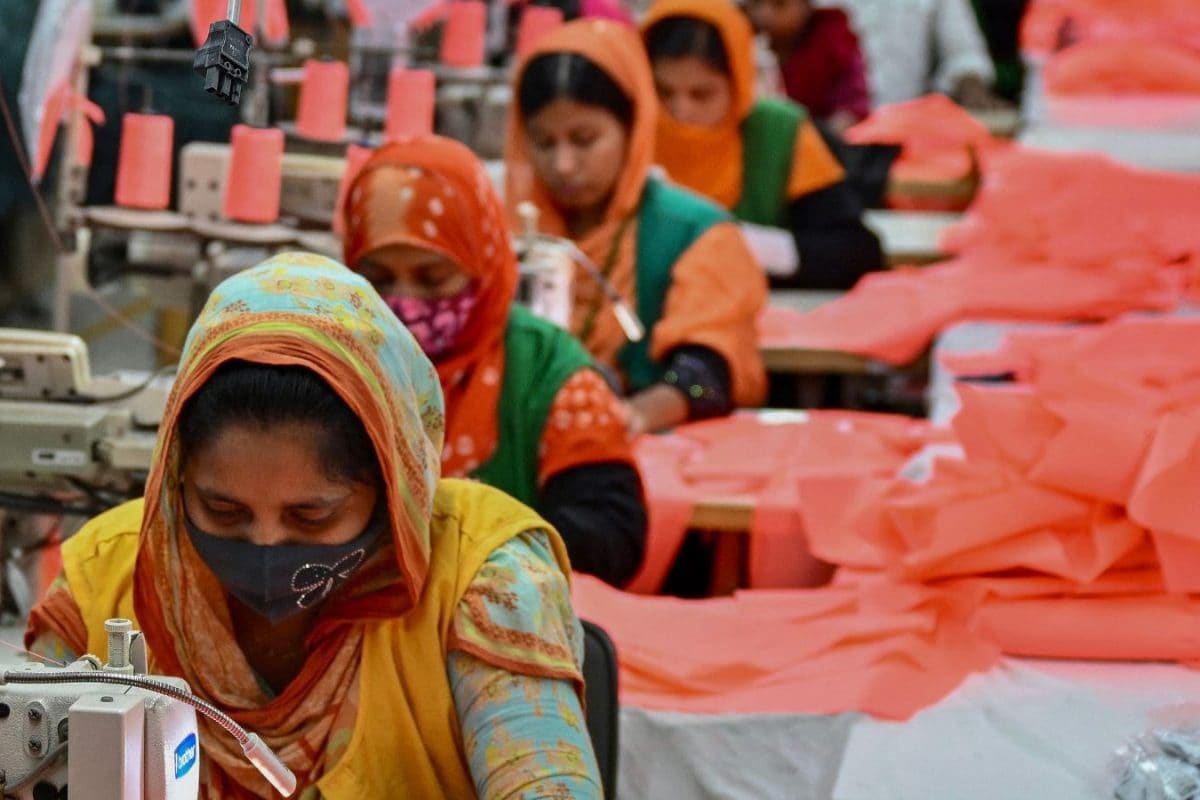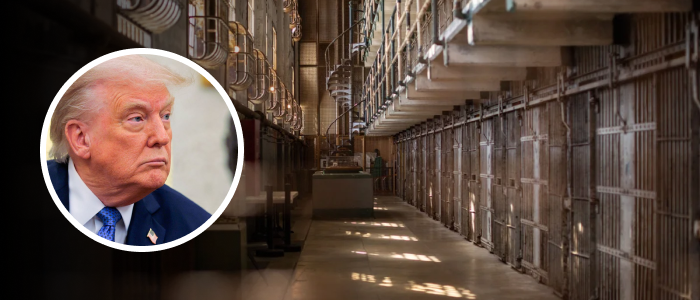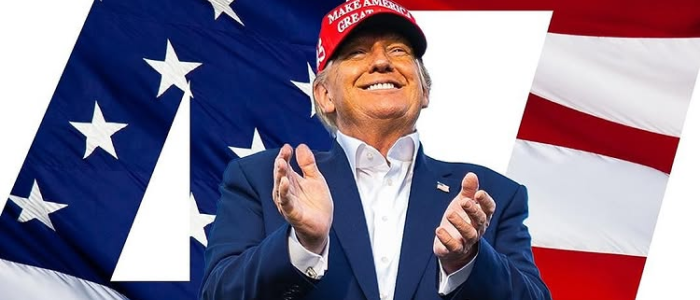From having a friend in India to facing a hard-headed rival, Bangladesh has everything to lose...
Read More In 2020, as the world battled the Covid-19 pandemic, global trade came to a standstill. Borders closed. Flights were grounded.

Supply chains froze. And few economies in the Indian subcontinent were hit harder than Bangladesh. The backbone of Bangladesh’s economy, its Ready-Made Garments (RMG) sector, faced an existential crisis.
This single industry accounts for roughly 85 per cent of Bangladesh’s total exports and 13 per cent of its GDP, employing nearly four million workers, mostly women. When global demand shifted to masks, medical textiles, gloves, and hospital clothing, Bangladesh had the orders — but no way to deliver. That’s when India stepped in.
At the peak of the crisis, the Sheikh Hasina-led government in Dhaka reached out to New Delhi, seeking help to overcome crippling logistical hurdles. In response, India extended a critical lifeline: a trans-shipment facility via Indian ports and airports. Why was this so important? Because Bangladesh’s own ports and airports couldn’t handle the volume.
The difference was stark—shipping costs from Kolkata ranged between $2 and $2.5 per kilo, while the same cargo would cost $5 to $6 per kilo if shipped directly from Bangladesh. For Bangladeshi exporters, this facility was a game-changer.
For India, it was a favour extended—free of cost—under the belief that neighbours stand by each other in times of crisis. Here’s how the facility worked: Bangladeshi export items were transported through Indian land borders and transferred to Indian ports and airports. From there, they would be shipped to global destinations like the UAE, UK, USA, and France.
Goods were trucked to Indian Land Customs Stations (LCS) like Petrapole-Benapole, and then moved to major ports such as Kolkata, Haldia, Nhava Sheva (JNPT), or airports like Delhi and Kolkata. From these Indian gateways, cargo was shipped or airlifted worldwide. This was a beneficial arrangement for Bangladeshi exporters.
Bangladesh’s airports lack the cargo-handling capacity of their Indian counterparts, and Indian airports—particularly Kolkata and Delhi—have direct flights to almost all key global routes. Beyond capacity, it’s also the cost that matters. Shipping from Kolkata airport to Western nations costs between $2 and $2.
5 per kilogram, compared to $5 to $6 per kilogram from Bangladesh. That’s almost three times more expensive. Add to this the fact that India extended this facility for free.
No additional costs for accessing Indian infrastructure. This was not just a gesture of goodwill—it was a diplomatic and economic favour at the highest level. But fast forward to today: that goodwill has worn thin.
The very facility that empowered Bangladesh’s exports has now been revoked. The reason cited by India? Growing congestion at Indian ports and airports, which was creating backlogs and driving up costs for India’s own exporters. The Apparel Export Promotion Council of India had previously urged the government to act—but the final trigger may not have been logistical, but political.
Even before India withdrew the trans-shipment facility, Bangladesh had been imposing restrictions on land ports and targeting cotton imports from India—signalling the new regime’s intent to scuttle economic ties with its largest neighbour. Around the same time, Md Yunus, the leader of Bangladesh’s interim government, made a deeply controversial and menacing statement about India’s northeast—in Beijing, no less. Calling for China’s involvement in India’s north-eastern states, Yunus described them as “landlocked" and claimed that Bangladesh was the “guardian of the ocean", implying control over their maritime access—a comment widely seen as both offensive and strategically provocative.
Assam Chief Minister Himanta Biswa Sarma hit back sharply, calling the statement “offensive and strongly condemnable". He flagged the remark as an echo of older narratives that sought to isolate the Northeast from the rest of India by targeting the fragile “Chicken’s Neck" corridor. “Such provocative statements by Md Yunus must not be taken lightly, as they reflect deeper strategic considerations and longstanding agendas," Sarma warned.
India needed to draw the red line—but it still gave Yunus a final chance to course-correct. A week later, Prime Minister Modi granted Yunus a meeting on the sidelines of the BIMSTEC summit in Bangkok. The meeting lasted 40 minutes, during which India raised concerns about attacks on minorities in Bangladesh.
However, Dhaka’s version of the meeting struck a discordant note, dismissing India’s concerns as “social media propaganda" and even suggesting India was open to the idea of restraining and extraditing exiled Bangladeshi President Sheikh Hasina, who is said to be in New Delhi. Indian government sources called this framing “mischievous and politically motivated." Days later, India officially withdrew the trans-shipment privilege—a clear signal that goodwill cannot be one-sided.
The decision is a major blow to Bangladesh’s textile sector, already reeling from the crisis exacerbated by last year’s violent regime change. For example, 170 factories in the Beximco Industrial Park have already shut down, with 40,000 jobs lost in that single cluster. From now on, Bangladeshi exporters will have to reroute their shipments through alternative hubs like Colombo, the Maldives, and Pakistan—a shift that will drastically increase both freight costs and lead times.
The president of the Bangladesh Garment Manufacturers and Exporters Association (BGMEA), Faruque Hassan, publicly appealed to India to reconsider the decision, calling it a “challenge" to the sector’s competitiveness. “Our freight costs will go up. Our lead time will increase.
It will reduce our competitiveness. I request the Indian government to withdraw this decision because we are your neighbours..
. Our diplomatic side should work with India and make some resolutions for this challenge," Hassan said. But Dhaka only complicated matters further.
In what was seen as a retaliatory move, Bangladesh halted yarn imports via Indian land ports, citing undervaluation and quality control concerns. The decision drew backlash from Bangladesh’s own exporters, who rely on Indian yarn for affordable supply. Bangladesh’s dependence on India for yarn is massive—95 per cent of its yarn imports come from India.
The current disruption could push production costs even higher. India was the perfect source: the heart and soul of textile raw materials. It has the capacity to deliver large consignments on time, with warehouses stacked at the border.
The quality is reliable, and the price is competitive. According to Mohammad Hatem, president of the Bangladesh Knitwear Manufacturers and Exporters Association (BKMEA), the price of 30 single yarn in Bangladesh is $3.40 per kilogram, compared to $2.
90 per kilogram in India and $2.96 in Vietnam. He warned that this ban “will be suicidal for apparel exporters", as manufacturers face raw material shortages that could further cripple production.
But will this hurt India? Unlikely. India has several thriving textile hubs, including Tiruppur and Ludhiana. During Bangladesh’s political crisis, many global apparel orders had already started shifting to India.
Indian policymakers, too, are betting big on the textile sector. Uttar Pradesh Chief Minister Yogi Adityanath recently announced the establishment of a 1,000-acre mega textile and apparel park in the state. And he didn’t forget to mention Bangladesh.
“If Bangladesh, with a population of 16 crore, can excel in readymade garment exports, why can’t India, with 140 crore people, achieve similar success?" he said. The essential question now is this: what happens when India decides to aggressively boost its own textile exports—even if it comes at Bangladesh’s expense? For Yunus, the yarn ban may offer an expensive face-saving gesture. But for Bangladesh’s textile sector, his government is proving to be an existential threat.
From having a friend in India to facing a hard-headed rival, Bangladesh has everything to lose in the game of ready-made garments. India has made it clear: access to Indian infrastructure and goodwill is not unconditional. This marks the end of an unspoken arrangement—where friendship and good neighbourliness were repaid with trust.
Whether this rift is temporary or long-term will depend on Bangladesh’s political choices in the months ahead. Because, as this episode shows: geography is permanent, but access is earned..
Politics

‘Suicidal’: Bangladesh’s Anti-India Stance Is Backfiring

From having a friend in India to facing a hard-headed rival, Bangladesh has everything to lose in the game of ready-made garments















